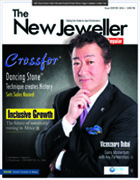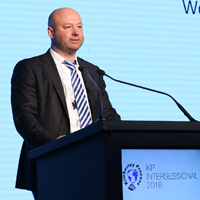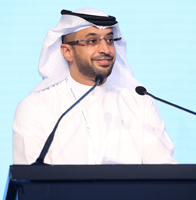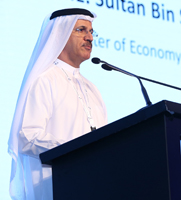


|
 |
| Home Technology / Education Events & News Archives Designs e - NewsLetter |
|
UAE FIRST ARAB COUNTRY TO CHAIR KIMBERLEY PROCESS AND TO HOST KP INTERSESSIONAL MEETING IN DUBAI
 Andrey Polyakov,
Andrey Polyakov,President, World Diamond Council  Ahmed Bin Sulayem,
Ahmed Bin Sulayem,Executive Chairman, DMCC The UAE has this year been selected as the first and only Arab country to Chair the Kimberley Process, an international group tasked with regulating the global diamond trade. Established in 2003 by the United Nations, 81 participating countries seek to ensure that unregulated rough diamonds do not enter the legitimate diamond market as a means to finance conflict. Over the past 13 years, this mandate has fostered greater transparency in the industry by implementing a rigorous certification scheme. In a welcome address His Excellency Sultan Bin Saeed Al Mansouri, Minister of Economy of the UAE, said: “The Kimberley Process is a global body that strives to enable trade to flourish in a safe and stable environment so that all participants and their dependent societies can benefit to the full. And this is why we believe it is so fitting that the UAE has built so many strong and lasting partnerships within this vital institution. “In the UAE, our doors are always open to friends and partners from every corner of the globe, from every walk of life, as we strive to reach a common goal together.” During his opening remarks, Ahmed Bin Sulayem, KP Chair, said: “I am deeply honoured to serve my country as the KP Chair in 2016 on behalf of the Ministry of Economy, and hope through a number of important initiatives, to successfully influence the work of the organisation over the course of this year. “I see two key tasks before us; addressing the true challenges of today to strengthen the KP and to set a path ensuring the Kimberley Process will meet the challenges of the future. “We have a responsibility to the entire diamond supply chain and its stakeholders to approach the most challenging questions and through consensus, power forward important, much needed change.” Remarks followed from the World Diamond Council President, Andrey Polyakov. Civil Society representatives did not attend the meeting. Speaking of the future of the KP as a tri-party initiative represented by government, industry and civil society, the UAE KP Chair urged a broader group of fellow international and credible NGOs to join the Kimberley Process to be a part of the future of the diamond industry; rather than to allow a single NGO individual, to prevent the Kimberley Process from enhanced collaboration with Civil Society. Reflecting on the progress made in the first six months as KP Chair, Mr Bin Sulayem highlighted the importance of the UAE KP Chair’s work with Central African Republic which have resulted in its sous-prefecture of Berberati recently being declared a compliant zone; and its progress following a visit to Venezuela earlier this year to assist the country in being re-admitted to full KP membership during his term as KP chair in its quest to resume diamond sales.  HE Sultan Bin Saeed Al Mansouri,
HE Sultan Bin Saeed Al Mansouri,Ministry of Economy of the UAE A key topic throughout the conference was on the subject matter of diamond valuation so much so that the UAE KP Chair hosted a one-day ‘KP Chair Special Forum’ on rough diamond valuation, as a precursor to the Kimberley Process Intersessional meetings on 23 May. The forum covered topics on rough diamond valuation challenges as well as the OECD’s work on enhancing the private sector contribution to responsible mineral supply chains and support to developing countries in raising revenue from executive industries. Within the KP, both the Washington Declaration from 2012, and the Moscow Declaration from 2005, were initial attempts to tackle valuation of rough diamonds. These declarations were outlined as policy goals and recommendations, but were never actioned in the industry. “Rough Diamond Valuation is a challenge that is not limited to one country, one diamond centre, or the Kimberley Process – it is a critical challenge for the entire diamond industry. In particular, it is a top priority for the diamond exporting countries in Africa, which are looking to get the best value from their mineral resource wealth. As KP Chair, it is my goal that our work will lead to a concrete action plan towards a set of best valuation practices and ultimately a level playing field for all importers and exporters of rough diamonds,” Ahmed Bin Sulayem, KP Chair, concluded in his opening remarks. The forum was joined by industry leaders from across the diamond industry, including large mining corporations, mining experts and senior advisors from KP Working Groups. OECD, who have developed the Due Diligence Guidance for Responsible Supply Chains of Minerals from Conflict & High Risk Areas, also joined the special forum as an industry specialist and observer. Ahmed Bin Sulayem, KP Chair, added: “I am delighted that the OECD participated in the KP Special Forum on Rough Diamond Valuation. The OECD is an institution with un-paralleled global experience related to valuation common approaches and supply chain due diligence, and the Kimberley Process can benefit greatly from leveraging their knowledge. As KP Chair, it is my goal that we begin taking the first concrete steps in tackling essential items such as enhanced data collection, financial transparency, cross-border trade and supply chain traceability for the benefit of our industry. |